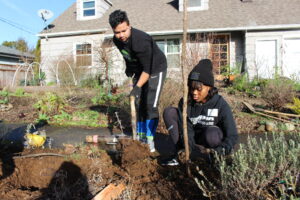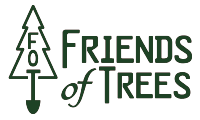Tree Care + Equity
 Most people by now are fairly well attuned to the benefits of trees environmentally, socially, mentally, and more. However, less people are aware of how tree canopy is distributed among a city and its neighborhoods.
Most people by now are fairly well attuned to the benefits of trees environmentally, socially, mentally, and more. However, less people are aware of how tree canopy is distributed among a city and its neighborhoods.
A trend across the country in large cities is that trees, and the benefits they bring, are distributed inequitably across neighborhoods based on race and income. Higher income neighborhoods with majority white residents have over 75% tree canopy coverage as compared to lower-income neighborhoods with around 15-30% canopy cover. These are large discrepancies that result in hotter environments, more air pollution, and factors contributing to respiratory conditions like asthma for children.
These trends are reality here in Portland: west Portland (excluding Forest Park) has about 75% canopy cover in most neighborhoods, while east Portland neighborhoods average about 15-30% canopy cover. Friends of Trees prioritizes planting street and yard trees in neighborhoods on the eastside of Portland to help decrease this disparity.
However, many people are wary about – if not outright opposed to – getting a tree of their own because of the costs of tree care, which can increase as a tree grows. This is just one of the reasons Friends of Trees provides tree care along with tree planting, including proper pruning of young trees at no cost to the property owner. And we’re exploring ways to increase the availability of low to no cost tree care for folks who need it, because we know the benefits of trees far outweigh the costs.
In the City of Portland, tree care and maintenance costs are the responsibility of the tree’s adjacent property owner. This is an inequitable financial burden for low-income households, renters, and populations vulnerable to gentrification. Many communities of color cite the financial burdens that a mature tree can bring as a reason to not want to plant trees next to their houses. It’s important to address these very valid concerns since trees have so many benefits, which is why Friends of Trees is continually working on creating programming that is responsive to community needs; in fact, we have funding proposals pending with Portland’s Clean Energy Fund that would help subsidize costs of mature tree care so we can grow our already considerable post-planting tree care services.
Understanding concerns about tree care
In 2018, Friends of Trees partnered with APANO and LARA Media to conduct three focus groups toward better understanding how community members viewed neighborhood trees and tree planting efforts. To increase accessibility these focus groups were conducted in multiple different languages including Vietnamese, Mandarin, and Spanish. Overall, many community members cited the benefits of trees within the city, including their health and environmental benefits:
“Trees are good for the lungs. They are the lungs of the city.”
“In the city, there’s big trees that make the air cooler. It also makes the city greener.”
–participants from the Vietnamese focus group
However, when asked if there are barriers for them to plant trees, many community members cited the long-term costs associated with mature tree care. One participant said: “One of the negatives is that sometimes Portland has a lot of storms and trees fall down when there’s strong wind. I experienced that once. The tree can fall into the house and collapse the house. Usually I try to hire a professional to cut the tree, but it [can cost] thousands of dollars. The tree bothers us.”
Trees and access to the natural environment are integral to healthy, livable neighborhoods. The benefits trees bring are strongest when they are mature, at least 10-15 years after they are planted. However, the fears community members have about the costs trees may bring are also valid, especially since the median household income on the eastside of Portland is lower and there are fears of being pushed out.
Friends of Trees is committed to equitably growing the urban forest through community-centered tree plantings. We offer tree care for the first three years of a tree’s life after it’s planted, including affordable (or free if cost is a prohibiting factor) summer watering service; free mulch; and structural pruning provided at no cost (see the next story for more about our pruning program). Structural pruning on a young tree is vital for its long term health, and can help prevent limbs falling onto a house or car later on in its life, since we can prune for the built environment and the tree will grow into that structure.
However, Friends of Trees also recognizes there are long term costs and concerns that need more support within our communities to make sure the urban forest is distributed equitably. We are continually working on creating programming that is responsive to community needs and when the opportunity arises we pursue grant funding to help subsidize costs of mature tree care. Because we know that, all in all, the positives of trees far outweigh the negatives; as our good friends at J Frank Schmidt like to say, “Trees are the answer.”
Photo: Street tree planting in east Portland, January 2020.
